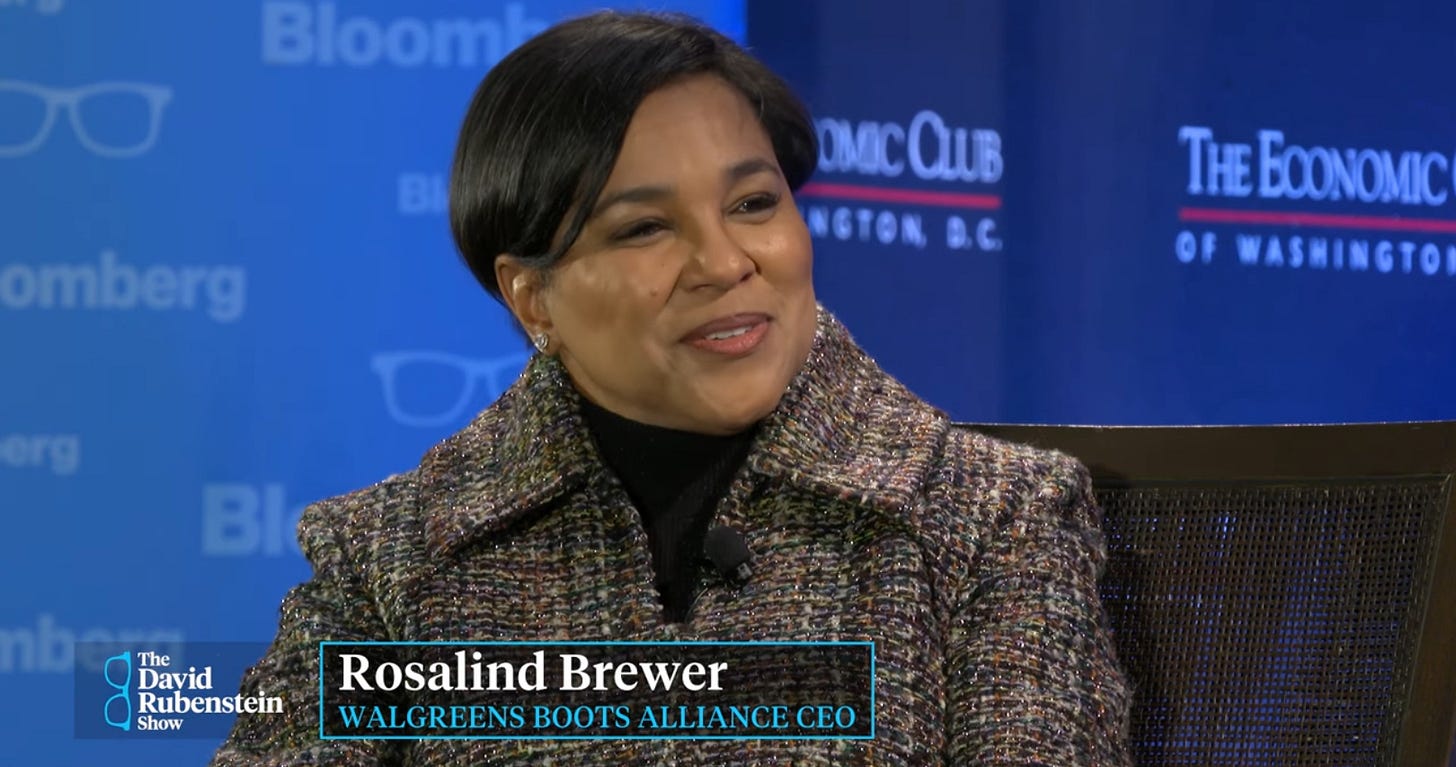Black Woman Walgreens CEO Takes Tumble Off Glass Cliff
No other Black women CEOs left on S&P 500 list.
Walgreens abruptly announced just before Labor Day weekend that its CEO Rosalind Brewer had stepped down and left the board, effective last Thursday. Brewer, 61, was the only Black woman CEO currently running an S&P 500 company, so her resignation — through “mutual agreement” — takes that number to a dispiriting zero.
“I am grateful to have had the opportunity to lead Walgreens Boots Alliance and to work alongside such talented and dedicated colleagues,” Brewer wrote on LinkedIn. “When I joined WBA in March of 2021, I couldn’t then imagine all that we’d accomplish together.”
Walgreens stock has lost two-thirds of its value since a 2015 high. Its stock rose 12 percent in August 2015 alone. Stock adviser The Motley Fool wrote, “Walgreens is an industry giant with a global footprint and a stable business that investors can sleep well at night owning. Even with the stock trading around 21 times 2016 earnings estimates, I think investors who buy the shares today are poised to do quite well over the long run.” This fool is now broke on a hill.
During Brewer’s two-year tenure, Walgreens stock lost half its remaining value, and shares continued plummeting this week. Wait, so does that mean Black women suck at corporate? No, this is most likely yet another example of the “glass cliff,” a term that describes when women are commonly promoted to leadership roles during times of crisis or downturn. They are clearly set up for failure, but obviously can’t turn down such a rare opportunity.
Walgreens has been in trouble for a while. It suffered significant losses during the pandemic and has struggled to pivot from its pharmacy and retail business to a singular focus on health care services. Along with CVS, Walgreens also agreed to pay more than $10 billion last December to several states in a settlement related to its alleged role in the opioid crisis.
Before Brewer, a former Starbucks and Sam’s Club executive, joined Walgreens, the last (and first ever) Black woman to command an S&P 500 company was Ursula Burns, who took the reins at Xerox in 2009 — perhaps not coincidentally during the financial crisis and the rise of the paperless office. Burns stepped down in 2016 when Xerox split into two independent companies. She has an estimated net worth of $1.25 billion so the sister’s doing all right.
Although not on the S&P 500 list, Thasunda Brown Duckett is the last Black woman CEO standing (probably because no seat was offered) on the Fortune 500 list. Duckett, 50, was named president and CEO of the Teachers Insurance and Annuity Association of America (TIAA) in 2021.
Obviously, considering I have so many fingers left on my hand to count, Black and Hispanic workers, especially women, are vastly underrepresented in the highest-paying and most influential positions, ranging from lawyers, marketers, and corporate executives. (They are also underrepresented in the science, technology, engineering and math — STEM — workforce.) The inverse is also true: They are concentrated and consistently overrepresented in organizations’ lower levels, in roles such as administrative assistants, technicians and laborers.
From USA Today:
Meanwhile, women – just 90 of them – make up 17% of named executive officers. Only 17 women of color were named executive officers in 2022, according to the analysis. Black women account for just 1% of top leaders. They are even more sparsely represented at the CEO level.
Yet law firms and other companies are being sued for supposed anti-white discrimination if they take any affirmative action toward resolving these diversity issues in the workplace, specifically at the higher levels of employment. Last month, flesh-suit wearer Stephen Miller’s white grievance group, America First Legal, asked the US Equal Employment Opportunity Commission to investigate Kellogg Co. over its gender parity and diversity programs.
In a letter to the EEOC, America First Legal Foundation’s senior counselor, Reed D. Rubinstein, wrote that Kellogg’s a publicly traded company, “engages in unlawful employment practices by seeking to 'balance' its workforce based on race, color, national origin, and sex.”
“Instead of equality of opportunity, which Kellogg’s defines as ‘giving each person the same things,’ Kellogg’s employment practices are unlawfully based on ‘equity,’ which is a euphemism for illegal discrimination,” Rubinstein said.
Miller and his toadies are so evil, they take companies to court when they even consider maybe, possibly giving women and other minorities a fair shake. They can’t risk the chance corporations might actually deliver on their diversity initiatives.
Rosalind Brewer’s replacement at Walgreens is Ginger Graham, who’s white but still a woman so she should watch her back.
Follow Stephen Robinson on Bluesky and Threads.
Subscribe to his YouTube channel for more fun content.
Catch SER on his podcast, The Play Typer Guy.




Oh god. One of the HR people wanted to talk to me separate from the rest of the group.
Her: I have a problem with you. You hired a drug and alcohol counselor who had a DUI.
ICC: I'm not sure I'd hire a drug and alcohol counselor who didn't have a DUI.
Her: What?
ICC: It's a very specific role. They have to understand what their clients are facing.
She's been getting all over my ass for a bit for me hiring the right people.
ICC: Seriously, convince the board to fire me. I'll go retire in Florene and open a private practive and earn triple what I do here.
Walgreens is a far right corporation, that I no longer shop in. So, I'm sorry this lady is losing her job, but Walgreens can bite me.
Also, too, their stock is plummeting because of STUPID decisions made by the higher ups, which is why they blamed OuT oF COnTrOl SHopLifTINg iN SAn FranciSco for their corporate losses. They can get fucked as far as I'm concerned.
//Concerned Libturd Shopper Rant Over